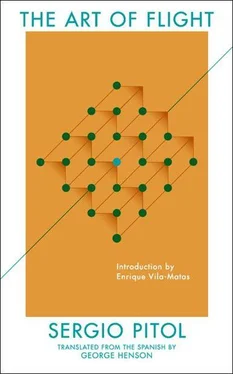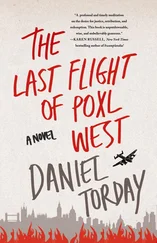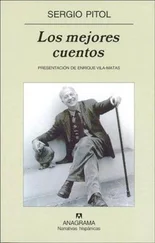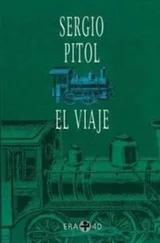Sergio Pitol - The Art of Flight
Здесь есть возможность читать онлайн «Sergio Pitol - The Art of Flight» весь текст электронной книги совершенно бесплатно (целиком полную версию без сокращений). В некоторых случаях можно слушать аудио, скачать через торрент в формате fb2 и присутствует краткое содержание. Год выпуска: 2015, Издательство: Deep Vellum, Жанр: Современная проза, на английском языке. Описание произведения, (предисловие) а так же отзывы посетителей доступны на портале библиотеки ЛибКат.
- Название:The Art of Flight
- Автор:
- Издательство:Deep Vellum
- Жанр:
- Год:2015
- ISBN:нет данных
- Рейтинг книги:5 / 5. Голосов: 1
-
Избранное:Добавить в избранное
- Отзывы:
-
Ваша оценка:
- 100
- 1
- 2
- 3
- 4
- 5
The Art of Flight: краткое содержание, описание и аннотация
Предлагаем к чтению аннотацию, описание, краткое содержание или предисловие (зависит от того, что написал сам автор книги «The Art of Flight»). Если вы не нашли необходимую информацию о книге — напишите в комментариях, мы постараемся отыскать её.
The first work in Pitol's "Trilogy of Memory," The Art of Flight imaginatively blends the genres of fiction and memoir in a Borgesian swirl of contemplation and mystery, expanding our understanding and appreciation of what literature can be and what it can do.
The Art of Flight — читать онлайн бесплатно полную книгу (весь текст) целиком
Ниже представлен текст книги, разбитый по страницам. Система сохранения места последней прочитанной страницы, позволяет с удобством читать онлайн бесплатно книгу «The Art of Flight», без необходимости каждый раз заново искать на чём Вы остановились. Поставьте закладку, и сможете в любой момент перейти на страницу, на которой закончили чтение.
Интервал:
Закладка:
It is well known that there is no tide without a counter-tide, action without reaction. And the undertows tend to be brutal. Perhaps in a bar, on a walk, in a party, I will suddenly regret not being in my garret, where I could take notes on the Shakespeare of Jan Kott, whose recent reading left me in awe, and study in an orderly fashion the Romantic poets, crucial to Polish literature, and then leap to Witkiewicz, Gombrowicz, and Bruno Schultz, and, in addition, read Borges, Cortázar, Neruda and Vallejo, Cervantes, Bernal Díaz del Castillo, Paz, and Fuentes, and write letters that I owe, and, above all, write stories, make up stories, write, write, write instead of drink like a Pole and go about life from binge to binge, instead of ruining my health, altering my nervous system, wasting my faculties, time, and energy only later to fully become the loser that at this moment I feel predestined to be.
I indulge in these sad meditations as I put my papers in their respective folders; I hasten to shave, get dressed and put on a tie. “The angel of order is still with me,” I feel reassured knowing that soon I will dine with Zofia; I’ll listen to her speak at length about her truest loves: Cervantes, Lope, Valle-Inclán, Lorca, and, above all, Tirso, whose Don Gil of the Green Breeches is by far her favorite work. And I find myself in that perfect dream when the phone rings. It’s Marek Keller. He has a performance tonight, he says; he’ll leave an invitation for me in the box office; afterward, there will be a party at Maja Berezowska’s house—“that old libertine,” as good people exclaim whenever anyone mentions her name. I am certain it will be an extremely entertaining gathering; just thinking of the radiant mob that awaits me that night is enough to feel overcome with joy. I know from experience that after the party someone will improvise another more modest one with fewer guests, and that perhaps the night will end in a raucous tour of those spots in Warsaw with the worst reputation. Almost without realizing it, I call Zofia to beg off and invent something so absurd that it ends up being convincing. I race to the theater where Marek’s Mazowsze is playing; afterward, I’ll allow myself to fall into the much anticipated well of chaos from which I will likely not emerge until breakfast time tomorrow.
Xalapa, May 1995
TRAVELING AND WRITING
For Julio Ortega
I amused myself recently rereading some fragments in an autobiographical notebook written some thirty years ago. I was hoping to find in its pages the atmosphere that enveloped the first years of my stay in Europe. A well-known editor of the time, Don Rafael Giménez Siles, invited a dozen young writers to tell their life stories. He seemed to be convinced that such an act would encourage a generation even greener than ours to find its path to literature. I doubt that those allegedly exemplary lives have fulfilled that purpose. The project was in many ways ridiculous; those of us who were chosen were engaged, to varying degrees, in an intense sentimental and literary education that in no way corresponded with a desire to trawl the enigmas of the past and use them to interpret the signs that governed our fate, let alone serve as examples and mentors for the very young writers whom in due time would take our place. I wrote those notes in Warsaw in early 1966. I had left Mexico five years earlier, visited several countries, and prolonged my stay mainly in two cities, Rome and Warsaw.
As I reread the text, I was left suddenly with this question: “Why do I get chills every time I think about returning to my country, which, of course, will have to happen, like it or not, someday?” Then I mentioned the circumstances that had prompted me to undertake this journey and to extend it indefinitely. It began with a sense of professional frustration: I was working at a publishing house where all my projects were systematically thwarted. It infuriated me to see that the practice of literature and the inevitable squabbles that resulted from it often concealed a noticeable intellectual disdain and hinted at aspirations that had little or nothing to do with literature. Some young intellectuals were beginning to seek a more intimate relationship with power than with the muses. My feelings toward political opposition groups, particularly the left, with whose ideals I identified most, were decidedly contradictory; I wanted them to grow stronger, but at the same time their methods seemed confusing to me, limited and far removed from any element of reality. More than anything, the empty rhetoric of official discourse sickened me, as well as the conformity of large swaths of the population to the restrictions of our democratic life and the backwardness of the country. I said all that to myself then, and it was true. But now I am able to see that in large part the state of frustration was related to having published a few years earlier a first book of stories that went unnoticed, and that after that I had stopped writing.
In mid-June 1961, I left Veracruz on the German ship Marburg . One morning, in the middle of the ocean, the bulletin we were given at breakfast announced that the ship, just as all units of the German merchant navy, would have to forego the originally scheduled stops (Le Havre, Antwerp, Rotterdam) and proceed without delay to a German port, where it should await further instructions. The officers, waiters, and German passengers showed signs of nervousness that we had not previously seen in them. We were treated with a condescending arrogance. They were custodians of secrets that concerned us, but were apparently forbidden to reveal. They had suddenly become our masters! That morning, among the passengers, there began to circulate a wide range of rumors, all catastrophic. That a new world war was about to break out was the first. Soon it had morphed into the aforementioned catastrophe had already begun. In the blink of an eye, the passengers’ imaginations had plunged into delirium. As the day went on, the recent destruction of Rotterdam was accepted as fact; thereafter, it was confirmed that there had been a coup d’état in Rome and that the Vatican was under siege; that the Pope had been physically assaulted as he attempted to leave his apartments; that in Zurich, Frankfurt, and Milan banks had suspended operations; that Rotterdam was not the city destroyed by bombs but Marseille; that it had not been Marseille but Dresden; that it had not been Dresden but Rotterdam; not Rotterdam, on the contrary, someone had heard from a very trustworthy source, a German woman, that the cities destroyed were Marseille, Bristol, and Salerno. In the bar, groups of passengers gathered around the radio for hours, trying to tune in to European stations, none of which confirmed the rumors that were spreading on board. There was talk, yes, of a very serious conflict emerging between the two German States, the division of Berlin, which, in the opinion of the more discerning passengers, was an attempt to prevent widespread panic. After dinner, the Captain brought us together to inform us of the itinerary change and the reasons that had necessitated it. We would disembark in Bremerhaven, the port closest to Bremen. The line would cover our passage by rail to our initial ports of destination, if by then the trains were still working as scheduled. The Cold War, he said, savoring the news with delight, was no longer cold, and we were standing on the threshold of a serious conflict with unpredictable consequences. In a single night they had built a wall dividing Berlin, making prisoners of all the inhabitants of the eastern sector. He fired off sentences with a dryness that scarcely matched the profusion of gestures and grimaces that accompanied them. All of a sudden, he had become one of the most baleful characters of the expressionist cinema. At every turn he interrupted his rant to receive from a subordinate’s hands cards that, we supposed, contained the latest news sent by telegraph. After reading the messages, his words became drier, his gestures more outrageous; he was a ventriloquist’s dummy whose movements escaped the master’s control. I was traveling with passage to Antwerp, where I would board a ferry that would take me to England. If the circumstances were as bad as they seemed, the Captain added, and if it were not possible to leave from Bremen, he recommended that we immediately contact the consular representatives of our respective countries. Deep down, I was as excited as the German officers, my blood raced with the same muddy drunkenness as theirs. I was ecstatic to find myself in one of those moments that could become a turning point of history. It did not occur to me in the least that my freedom, much less my life, might be in danger if war broke out. On the contrary, in radical opposition to my pacifist ideas, I considered the opportunity to be the beginning of a chain of exciting new events capable of wresting me from the stupor I was experiencing. Like the Germans from Marburg, I felt an exhilarating charge of electricity run through me, except, unlike them, I was convinced that the outbreak of war would once again mean the defeat of Germany and the beginning of a new world. At moments the session took on an intensity of Wagnerian proportions. Conversely, during the next four or five days, the last of the trip, the conversations turned melancholy. I ate with Belgian and Dutch passengers; the exuberance of the first day had waned; wild rumors were no longer circulating; nobody ventured hypotheses. They behaved more with the resignation of hostages than that of free men. Of our arrival to the German port, I remember, above all, the harried confusion of the landing and the difficulties hours later loading the luggage onto a crowded train that was departing for Holland. I did not receive passage to Antwerp but to a small Dutch port from where a ship would leave for Dover. Before leaving Bremen, I was able to visit a magnificent exhibition of recent works by Picasso with a young Swiss couple I had met on board. With the greatest irresponsibility, we abandoned our trunks and suitcases in the lobby of a completely deserted gallery and toured for a while its sepulcher-like halls. “It would be easy for us to steal a picture,” the husband told me, and for a moment the idea worked us into to a frenzy. Everything was possible during what we believed to be a time of war. Fortunately, it was not.
Читать дальшеИнтервал:
Закладка:
Похожие книги на «The Art of Flight»
Представляем Вашему вниманию похожие книги на «The Art of Flight» списком для выбора. Мы отобрали схожую по названию и смыслу литературу в надежде предоставить читателям больше вариантов отыскать новые, интересные, ещё непрочитанные произведения.
Обсуждение, отзывы о книге «The Art of Flight» и просто собственные мнения читателей. Оставьте ваши комментарии, напишите, что Вы думаете о произведении, его смысле или главных героях. Укажите что конкретно понравилось, а что нет, и почему Вы так считаете.












